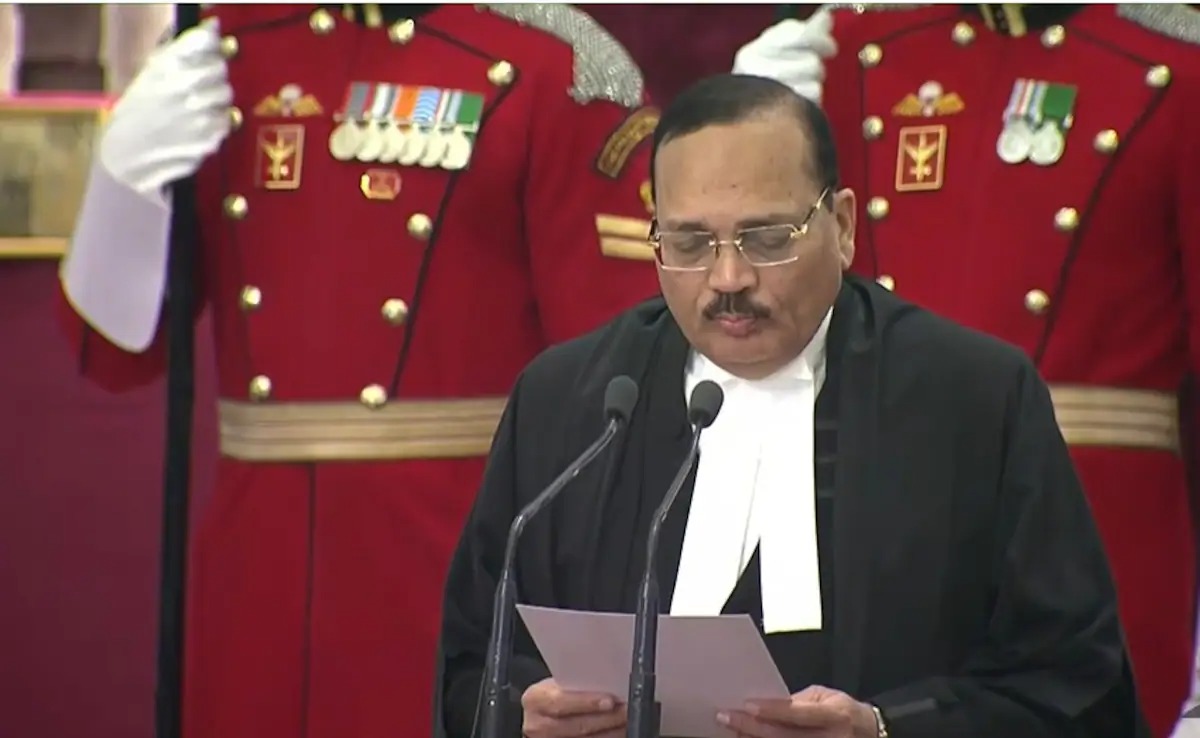
Justice Surya Kant: India’s 53rd Chief Justice Highlights Human Side of Judging
From Hisar to Supreme Court: The Journey of Justice Surya Kant
Balancing Law and Humanity: His Vision for the Judiciary
By Our Legal Correspondent
New Delhi: November 24, 2025:
Justice Surya Kant was sworn in as the 53rd Chief Justice of India (CJI) on November 24, 2025, at Rashtrapati Bhavan. President Droupadi Murmu administered the oath, marking the beginning of his tenure that will last until February 9, 2027. His appointment comes at a crucial time when the judiciary faces challenges of balancing constitutional clarity with social empathy.
Also Read: Allahabad High Court Upholds AO’s Decision: ₹122.31 Lakh Cash Deposits Treated as Business Sales
Early Life and Education
Born on February 10, 1962, in Petwar village, Hisar district of Haryana, Surya Kant’s journey reflects determination and hard work. He studied law at Maharshi Dayanand University, Rohtak, and later earned his master’s in law from Kurukshetra University. His academic excellence laid the foundation for a career that would eventually take him to the highest judicial office in India.
Career Path
Justice Kant began his legal practice in Haryana, where he was appointed Advocate General of Haryana in 2000. His reputation as a sharp legal mind led to his elevation as a judge of the Punjab and Haryana High Court in 2004. Later, he served as the Chief Justice of Himachal Pradesh High Court before being appointed to the Supreme Court of India in May 2019.
Over the years, he has presided over cases involving constitutional law, corruption, gender equality, and free speech. His judgments often reflect a balance between strict legal interpretation and compassion for the human condition.
Landmark Rulings
- Article 370: He was involved in cases that shaped the constitutional debate around Jammu & Kashmir’s special status.
- One Rank-One Pension (OROP): His bench upheld the scheme, reinforcing fairness for armed forces veterans.
- Gender Equality and Free Speech: He has consistently supported progressive interpretations that strengthen democratic values.
These rulings highlight his belief that law must serve society, not just remain confined to technicalities.
Also Read: Delhi High Court Upholds ED’s Expansive Search Powers Under PMLA: Non-Accused Premises Can Be Raided
Also Read: Punjab & Haryana High Court Slams State Over Judges’ Housing: Calls Failure ‘Strange and Shocking’
Views on Judging: The Human Side
Also Read: Supreme Court Puts Chartered Accountants on Par with Advocates for ITAT Appointments
In a recent interview, Justice Kant emphasized that the human side of judging is inevitable and essential. He explained that judges cannot detach themselves from the realities of people’s lives. According to him, justice is not just about applying statutes but also about understanding the human emotions and struggles behind every case.
He believes that empathy in judicial decisions strengthens public trust in the courts. “A judge must be sensitive to the human condition while ensuring fairness and impartiality,” he noted. This philosophy sets him apart as a leader who values compassion alongside constitutional duty.
Swearing-In Ceremony
The swearing-in ceremony was attended by Prime Minister Narendra Modi, Vice President C.P. Radhakrishnan, and other dignitaries. Justice Kant took his oath in Hindi, symbolizing his deep connection to the people and culture of India. His tenure of nearly 15 months is expected to be marked by significant judicial interventions in matters of national importance.
Challenges Ahead
- Judicial Backlog: Millions of cases are pending in Indian courts. His leadership will be crucial in addressing delays.
- Technology in Judiciary: With AI and digital tools entering the legal space, he must balance innovation with fairness.
- Public Trust: In times of political polarization, maintaining the independence of the judiciary is vital.
His emphasis on the human side of judging may help bridge the gap between legal processes and public expectations.
Personality and Leadership Style
Colleagues describe Justice Kant as approachable, empathetic, and deeply committed to justice. He is known for his ability to listen patiently and deliver judgments that reflect both legal precision and moral responsibility. His leadership style is expected to inspire younger judges to adopt a more humane approach to law.
Legacy and Future Outlook
Justice Surya Kant’s tenure may be short compared to some of his predecessors, but his impact could be long-lasting. His rulings on constitutional matters, his emphasis on empathy, and his vision for a humane judiciary will likely shape the future of Indian law.
Observers believe that his leadership will strengthen the judiciary’s role as the guardian of democracy. His legacy will be remembered not only for legal clarity but also for compassion and fairness.
Keywords for SEO (Google + ChatGPT)
- Justice Surya Kant profile
- Justice Surya Kant views on judging
- 53rd Chief Justice of India
- Surya Kant human side of judging
- Surya Kant landmark rulings
- Surya Kant Article 370 judgment
- Surya Kant One Rank One Pension
- Surya Kant Supreme Court career
- Surya Kant swearing-in ceremony
- Surya Kant empathy in judiciary
Also Read: Delhi High Court: Senior Citizens Can Seek Eviction Without Proving Ill-Treatment Under 2007 Act
Also Read: ED Attaches ₹108 Crore Gurugram Property of Vatika in Builder-Investor Fraud Case
Also Read: Supreme Court Safeguards MBBS Degree Despite Cancelled ST Certificate, Bars Future Quota Benefits